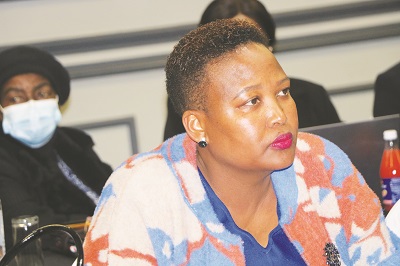By T’soloane Mohlomi
MASERU – Due to multiple recent global cyber-attacks, Lesotho is said to be in dire need of a Central Incident Response Team (CIRT),
The response team will be precisely tasked with the combating of various inevitable cyber-attacks on the country’s digital security grid.
This alarming revelation was made by the International Cyber security Union (ITU) through a recent workshop held Maseru, which was meant to capacitate stakeholders and policy makers while sensitizing them and raising the pressing need of taking cyber security threat very seriously.
The ramifications and impacts of cyber security breaches on world countries has in most cases proved devastating and having a negative impact on the economy in some instances it can take a long time and require a substantial amount of resources to recuperate the imparted losses.
Speaking at a special session held for Members of Parliament (MP) during the four day workshop, Minister of Information, Communications, Science, Technology Hon. Nthati Moorosi said they as parliamentarians appreciated the knowledge they received from the ITU workshop, saying that all sectors of the country could benefits from the important teachings contained in the presentations.
Hon. Moorosi said the workshop had come at a good time when parliament was still in recess as it afforded the house time to deliberate on the plans of action in terms of legislation so that informed proposals can be made at the time when the house commences.
“Due to this important workshop, I hope parliamentarians now have an insight of the importance of the Cyber Security Bill. The digitization of agriculture, the integration of digital identification technologies to enhance financial inclusion and the advancement of e- education in its various facets, the sustainability of enterprises in the digital age are underpinned by the adoption of innovation and digital changes as a strategy for improving the efficiency and performance by organizations.
“If care is not given such digital exposures can eventually lead to digital disasters or disruptions, both of which require cyber security,” she said.
During the workshop which was facilitated by ITU regional cyber security coordinators and experts, Marwan Ben Rached, potential threats to critical national infrastructure were discussed, and using practical examples and occurrences the effects proved harder to recover than was to prevent.
According to the ITU, with natural disaster accounting to $313 billion of world economic loss, in 2022, in contrast the cumulative damage due to cybercrime in 2022 amounted to a staggering $6 trillion.
One international example was an incident known as the Bangladesh Bank Heist, where the servers of the Bangladesh Central Bank were hacked and perpetrators were able to transfer close to US$ 1 billion from the Federal Reserve Bank of New York account belonging to the Bangladesh Bank, the Central Bank of Bangladesh.
The ITU warn that Central Banks are primary targets for hackers.
Cyber-attacks can also lead to fatalities and one ITU report from Germany indicated a woman having died due to a computer cyber-attack at a hospital she was rushed to for an emergency.
International relations can also be strained as hackers could use government websites in disseminating false information which could cause damage to reputation or even cause a rift between nations.
Economic impacts are a cause for concern, using real life examples coordinators showed how economies are affected by attacks. On 15 August 2012 Saudi Aramco, one of the world’s largest oil company was a victim of an attack which led to the company losing billions of dollars due to a self-replicating virus which infected as many as 30,000 of the company’s windows based machines rendering its computers unusable.
Despite Saudi Aramco’s vast resources as Saudi Arabia’s national oil and gas firm, reports indicate that it took close to two weeks to recover from the damage and with Saudi Arabia being the world’s number one oil producer the incident caused a huge spike on global gas prices.
In response to these growing global concerns ITU coordinator Marwan Ben Rashed making an example of Malawi said it was of the utmost important for Lesotho to form a national response team which would always be ready to deal with the threats should they arise.
“It is important to have a Central Incident Response in place both on a national level and even on company levels should these attacks occur because no one is really safe as incidents usually happen without warning.
“These CIRT’s should be proactive and not reactive so they can interact with other international bodies to anticipate potential attacks, I really urge government to take this issue seriously and get the ball rolling with legislation,” he said.


